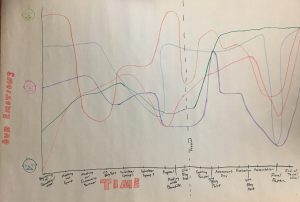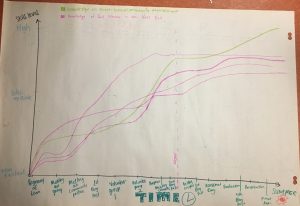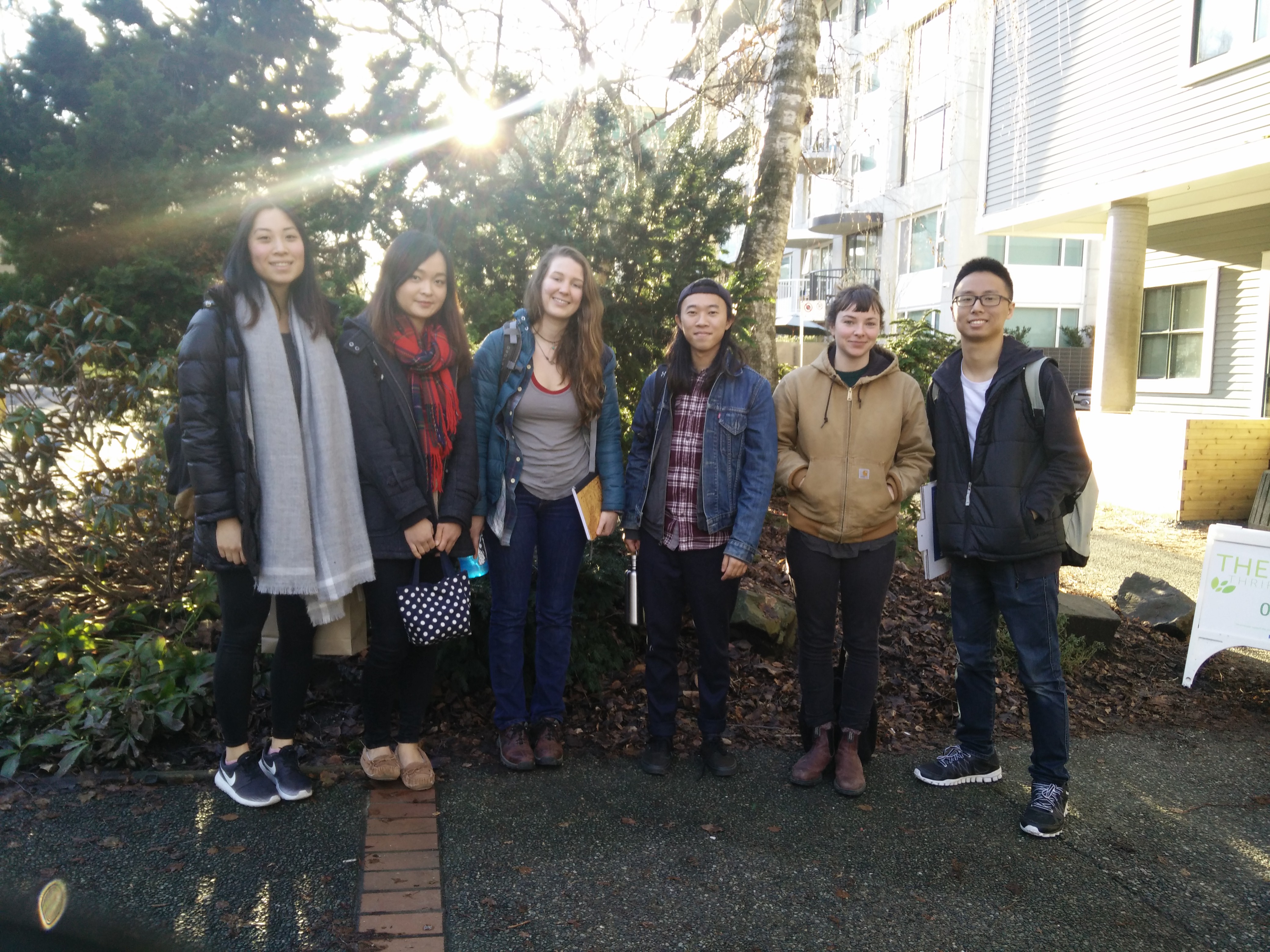BLOG #2
Hello and welcome back to our blog! Two months later and one member fewer (Bye, Dean), this blog post outlines our progress so far. We are now in the midst of our project, and this experience has elicited much frustration, sweat, laughter, and excitement. Diving head first into our community has truly shined light on intricate social complexity that governs our project, and we feel joyously but also painstakingly enlightened.
We have drafted our proposal for the project. In the proposal, we outline our objectives and what our next steps will be. Feel free to take a look by clicking on the link below
Link —–> Proposal
Articulate your Weekly Objectives and Achievements
An ongoing objective for our group was to get a sense of how Gordon Neighbourhood House functions on a regular basis, specifically on Fridays. Fridays are one of the busiest days for the Neighborhood House, because this is the one day of the week where the Food Bank sets up to provide food packages to those who are food insecure. Starting at 9am, the main floor of GNH becomes quite chaotic, with patrons anxiously waiting in line, excited to see what items they were about to receive, as well as a handful of joyful volunteers who work together to ensure a smooth-sailing experience. Just a staircase away from the chaos is the second floor, which hosts the Food Hub, Soup Kitchen, and Cooking Demonstrations. Our goal was to volunteer on a bi-weekly basis and immerse ourselves in these various programs to grasp a sense of how these programs work and how they support the patrons.
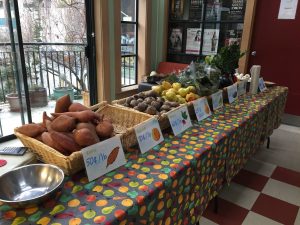
Joey, the resident Farmer and Head of the Food Hub, focuses on purchasing a variety of fruits and vegetables for patrons to try. For this particular week, the produce available include: yams, squash, beets pears, red lettuce, eggplants, rainbow swiss chard, and mushrooms.
After having volunteered 2-3 times, each of us have now achieved our goal of understanding how the various programs function and how they come together to benefit the patrons themselves. Shown above is the Food Hub stand, where produce is sold to patrons at a reduced cost to provide access to nutritious and affordable goods (sometimes local and organic!). The Food Hub is a great way for those with limited resources to still have dignified experiences with food-purchasing using their own source of income.
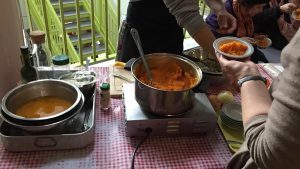
Chef Peter handing out samples of his vegetable hash, which includes the yams and squash sold at the Food Hub, potatoes which were part of the Food Bank packages, as well as rosemary from GNH’s balcony herb garden.
The Cooking Demonstration, as shown in the picture above, is hosted by Chef Peter. On Fridays, he takes on the challenge of incorporating the various foods from the Food Bank packages as well as the produce being sold at the Food Hub to create a delicious, hearty, and nutritious meal for patrons to enjoy. Not only do the Cooking Demonstrations provide recipe ideas for the patrons, but it is also a great way for the patrons to improve food literacy by socializing with Chef Peter to learn new cooking techniques.
The Soup Kitchen provides a dignified restaurant experience for the patrons. Right as they enter, they are greeted by servers who will offer them a variety of beverages, sandwiches, and soups. Using food as the medium, the Soup Kitchen creates a safe, welcoming environment for the patrons, who are able to socialize with one another to create positive food memories.
Having a good sense of these various programs, one of our other objectives was to assess GNH and see how we could utilize their strengths to further their mandate of providing welcoming and dignified access to food. Our main goal was not to create temporary food literacy workshops, but to develop an idea that would have a long-lasting effect and could be maintained by regular staff once our group leaves. With that in mind, we were able to brainstorm ideas with Chantille (Director of Community Initiatives) and narrow them down to the most relevant, effective, and applicable ones. This was a huge achievement in our minds because up until this point, we were quite uncertain about our direction and approval of our ideas. Our meeting with Chantille provided us the opportunity to share our perspectives of Gordon Neighbourhood House as outsiders looking in. Chantille was also able to provide an insider’s perspective and give feedback on our ideas. With that said, we were able to narrow down the main focus of our project, which is to develop a recipe book that would incorporate contributions from various members of the community, including the volunteers, the directors (Chef Peter, Joey the Farmer, etc.), as well as the patrons themselves. The recipe book will provide a platform for participants to share their fondest food memories and their to-die-for recipes for all to enjoy. This book will also be a great way to promote food literacy among the patrons that visit GNH. More details regarding our plan will be outlined in our upcoming objectives.
Reflecting on a moment of significance
A moment of significance for all of us is the first time we volunteered at the Food Hub. In the paragraphs below, we reflect on this experience, what we took from it, and how it has changed the course of our project.
WHAT: Looking back at the beginning of our project, we did not fathom that our group came into the project with preconceived notions of what a food hub is during our first meeting at Gordon Neighbourhood House. Although we knew that the Food Hub program at Gordon Neighbourhood House differs from traditional food banks and charitable services by centering its mandate around empowerment and dignified access to food, it was hard to shake off our assumptions on the roles of a food bank and the demographic of patrons that participates in the program. In hindsight, this is clearly reflected in our initial suggestions for programs and activities that we wanted to implement in the Food Hub, that were to a large extent rooted in a “food banks as a service” mindset. However, the Gordon Neighbourhood House greatly exceeded our expectations during our first volunteering shift in the Food Hub and we soon came to realize that the Food Hub is more multifunctional than we could initially grasp. There are complex issues surrounding food insecurity, such as social stigma, which need to be taken into consideration when designing new programs or improving existing programs. Needless to say, it was eye-opening when we realized that our initial ideas did not take into account this complexity. This was undoubtedly a key moment in our progress as it forced us to confront our assumptions, which led us to abandon said assumptions and to embrace the multi-functionality and complexity of the Food Hub programs. Just as Tim Hardford mentioned in his TED-talk, we should learn to appreciate the uncertainty and messiness in problem situations because they have the potential to increase our learning, creativity and achievement (Hardford, 2016).
SO WHAT: The insight we gained from this experience matters because it allowed us to consciously shift our mindsets from working for the people to working with the people. It gave us a deeper understanding of the Food Hub. We realized that as “outsiders”, it is crucial to collaborate with the community and people who work in the Food Hub because they have the knowledge and expertise on social issues surrounding food insecurity that we could never fully learn in a classroom setting. Hence, the success of our project and our capability to reach a more profound understanding of community food security rest on our ability to internalize the inputs from the community and incorporate them into our way of seeing the issues at hand. This same idea was eloquently stated by Bang, Lee, and Medin (2014), which goes “It is commonly said that scientists should have a professional distance from what they study. But the metaphor of distance is misleading. Science, like a painting, necessarily has a perspective. To the extent that we can remove our biases and learn from multiple perspectives, we will understand our world better”. We found that the aforementioned quote truly underlines the insight that we got from this experience thus far. It is crucial to acknowledge that there are multiple, equally valuable ways of looking at the same issue, and understanding an issue from multiple perspectives allow us to discover new dimensions of our issues at hand as well as to recognize the inherent biases and preconceived notions that could hold us back.
NOW WHAT: In light of this learning, we have changed our strategy to root our ideas in the strengths of the community as outlined by Asset-Based Community Development. For example, focusing on their stories, recipes, and insight, rather than focusing on our (inherently biased) ideas. This is because people of the community, rather than external experts, are the best at driving development due to their ability to recognize and mobilize existing assets (Mathie and Cunningham, 2003). Our new approach takes into account the sense of safety patrons should feel safe when utilizing the Food Hub. We were considering the idea of conducting a survey to understand the needs and the desires of the community, however we quickly moved away from this idea as we saw that it would tokenize food insecure patrons and reduce them to objects for research rather than subjects that deserve meaningful consideration. Henceforth, we moved away from surveys to personal qualitative assessments. This entails engaging the patrons in conservations to better understand their strengths and issues rather than approaching them for academic research purposes. Building relationships is a crucial principle of Asset-Based Community Development and we want to put emphasis on said approach (Mathie and Cunningham, 2003).
Upcoming Objectives
• Contact groups associated with the GNH food related programs such as the Veggie Soup-a-Stars and the Rainbow Soup Social.
• Obtain recipes and personal stories from the groups mentioned above and from various members of the community in order to create a recipe archive and recipe exchange to further promote food literacy, intercultural dialogue, and community bonding.
• Graphically design templates for the recipes and personal stories obtained (also for future use), organize the recipes along with their stories into a binder using the templates, and with our budget, we will also print some take-home recipe pamphlets for patrons
• Pilot the recipe sharing idea during GNH Food Hub Assessment Day on March 10, 2017. We will also provide soup samples and free food samples in order to entice the patrons to chat with us and engage with GNH, as well as get a feel of how patrons are reacting to the recipe book and food stories idea.
Strategies for achievement
After our discussion with Chantille, we discovered that there are two main groups associated with GNH and they are responsible for creating the meals for Monday Pay-What-You-Can Lunches and Friday Soup Kitchen. These are, respectively, The Veggie Soup-a-Stars and the Rainbow Soup Social. Veggie Soup-a-Stars are a group of volunteers that come together at GNH every Sunday evening in order to socialize and cook delicious vegan food for the pay-what-you-can lunch hosted on Mondays. Rainbow Soup Social serves a similar function and comprises of a group of LGBTQ individuals and their allies that gather on Thursday evenings to make soups for the Friday Soup Kitchen. This gathering also acts as a support group to provide community, support, and a sense of belonging to the LGBTQ individuals that may not have come out to their loved ones yet.
Chantille has been so kind to connect us with these groups through e-mail. We plan to set up a meeting time with the two groups, one on the upcoming Thursday (Feb. 23, 2017) and one on Sunday (Feb. 26, 2017). During our time with them, we hope to chat casually and engage with them on a personal level. Furthermore, we hope to gain a better understanding of their stories, challenges, passions, and finally obtain some of their delicious recipes. On top of that, we hope to gather recipes and stories from the employees and volunteers at GNH, especially the individuals that have a good relationship with the patrons of GNH (Peter the Chef, Joey the Farmer and other long term volunteers) during our next volunteer day at the Food Hub. It is our hopes that this would bring the patrons and the GNH employees/volunteer closer, fostering a sense of community in GNH amongst people of all walks of life. In the long run, we hope that the recipe book would entice patrons to share their own recipes and stories.
After obtaining a collection of recipes and personal stories, we plan to organize them into a binder. We will also spend some time to design an easy-to-understand and simple-to-fill-out template for the recipes that we have gathered and future recipes to come. To ensure that we maximize the opportunities for engagement and spreading food literacy, we have decided to utilize a part of our budget to print a few take home recipe pamphlets for patrons who are interested in bringing them home.To witness our ideas in action, we plan to pilot the recipe exchange during the GNH Assessment Day on March 10, 2017 by setting up a booth downstairs near the Food Bank area with our recipe binder and pamphlets on display. We will also have soup samples and free food samples from one of the more popular recipes to give out and entice visitors with. This way we can chat with them about our recipe archive, while building trust and ensuring that patrons still feel empowered and safe.
Signing off
For us personally, we feel that our project is finally taking off and we are beyond excited to see how our community partner and patrons of GNH will respond to our ideas. We are also thrilled that we get to work with other segments of our community partner, such as the the two volunteer groups that do the amazing task of preparing the meals for the Monday Pay-What-You-Can Lunch and Friday Food Hub. We aim to hear their inputs and their thoughts on our ideas. We believe that their expertise will greatly help us in enhancing our project with the community.
We will update you guys as soon as Assessment Day arrives, and we will let you know how the GNH patrons respond to our recipe book and recipe template idea. Stay tuned and check our blog website for the next post! Until then, take care and enjoy the spring weather!
Cheers,
Sophie, Annah, Jeffrey, Belinda, and Olivia
References:
Bang, M., Lee, C., & Medin, D. (2014). Point of View Affects How Science Is Done. Scientific American. From http://www.scientificamerican.com/article/point-of-view-affects-how-science-is-done/
Hardform, T. (2016). How messy problems can inspire creativity. Tel Talks. Retrieved from https://youtu.be/Jd_j_kw_jZQ
Mathie, A., & Cunningham, G. (2003). From clients to citizens: Asset-based Community Development as a strategy for community-driven development. Development in Practice, 13(5), 474–486.

